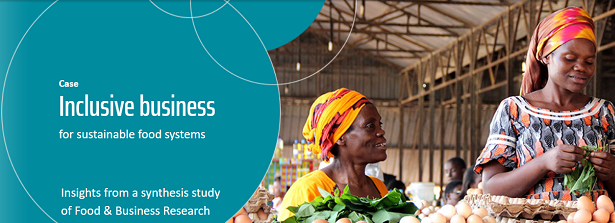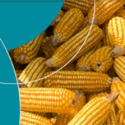Inclusive business for sustainable food systems: Putting the last first

How can business models be profitable and benefit low income populations, aim to address societal problems, including poverty and food and nutrition insecurity, and promote sustainable livelihoods? This is the key question explored in a synthesis paper that has recently been produced discussing Research for Development insights and innovations regarding these business models, commonly referred to as Inclusive Business models. Inclusive Business has gained much prominence in international policy debates and research on sustainable and inclusive development in recent years. The synthesis shows that inclusive business models can be viable when innovations are adopted that are affordable in the long-run, applicable to the problem at hand, and accessible to all. The criteria and conditions for these innovations must be set in co-creation with the poor and marginalised. Moreover, the pervasive barriers as well as hidden costs that small-scale food entrepreneurs face, must be addressed upfront by practitioners and policymakers.
This paper “‘Inclusive business for sustainable food systems: Putting the last first” is the third thematic publication of a larger series of publications commissioned by NWO-WOTRO, together forming a synthesis study of the Global Challenges Programme (GCP) and Applied Research Fund (ARF) projects under the Food & Business Research programme, executed by Daniëlle de Winter and Ellen Lammers.
Thirteen interdisciplinary research projects were reviewed for this synthesis paper. These projects addressed a range of business processes and innovations by and for small-scale producers and entrepreneurs in the agri-business sectors in countries across sub-Saharan Africa and southeast Asia. Some key insights gained on the opportunities and constraints of sustainable inclusive business initiatives in contributing to food and nutrition security are presented here.
The synthesis paper stresses that innovations supporting inclusive business are only relevant and effective for the poor and marginalized when they are applicable to a specific problem and context, affordable at low costs, and accessible to all. This Is called the Triple A: applicability, affordability and accessibility. These three aspects can be summarized as follows:
To ensure innovations are applicable by marginalized groups that lack, or have limited access to, certain resources (e.g. capital, time, (scientific) knowledge), the research projects introduced both social solutions (e.g. mapping of needs, building on local and indigenous knowledge) and technical innovations (e.g. mobile fruit dryers or improvements in animal feed). A combination of both offered the best chances for applicability. Moreover, modest changes to current production techniques – rather than high-tech or complex innovations – were often the best answer to the day-to-day struggles of small-scale farmers and entrepreneurs.
The affordability of innovations strongly depends on the hidden costs experienced by small-scale food producers and entrepreneurs. Both in the short and long term, hidden costs (e.g. lack of transportation means, childcare obligations, limited decision-making power, tenure insecurity) render many innovative agri-business solutions unaffordable. To tackle this, projects identified the need for awareness raising about actual market risks, while simultaneously building the knowledge and skills of the target groups. Care must be taken to ensure that solutions meant to reduce the hidden costs do not sustain or even exacerbate inequalities and causes for exclusion.
Marginalized groups can benefit more fully when innovations are made accessible through collaboration (to reach scale and to combine diverse knowledge and skill sets) and by establishing connections (to build on each other’s knowledge to create effective supply chains and to connect to markets). Creating access to and ensuring that the voices of the poor and marginalized are heard in platforms and domains where knowledge is (co-)created and shared is essential for inclusive business processes. The synthesis paper shows that strategic alignment of cooperatives or producer groups is a key condition to amplify the voices of the marginalized in market negotiations. When cooperatives or women’s associations are registered and formalized, this can moreover create new business opportunities with formal stakeholders.
The synthesis paper stresses that, when introducing new business models, attention must be paid to potential trade-offs between business growth on the one hand and social and environmental values on the other hand. Policy makers and practitioners should be made aware of the institutional and resource conditions that can help mitigate these trade-offs so that business development does not come at great social cost or result in natural resource depletion or pollution. Inclusive business can only flourish in an enabling governance environment that recognizes a priori – and not as an after-thought – the needs, priorities and agency of poor and marginalized populations.
Moreover, very limited information is available on the food quantities, qualities and flows that are produced and marketed by and for marginalized groups. There is a need to systematically map as well as monitor who produces what, and for whom. Only then can the contributions of these groups to local food systems become visible, and their priorities and needs be understood and attended to.
Finally, the projects studied in this synthesis paper showed that innovation comes from all directions. Investments in validating not only scientific innovations but also local, bottom-up innovations offer the most potential for enhancing inclusive business. Through co-creation, viable business opportunities for marginalized groups can be identified and tested. However, the power dynamics inherent in such processes must be addressed to make them successful. This implies asking the critical questions: whose knowledge dominates the co- creation processes, and which insights are prioritized?
Downloads
- Download the full paper “Inclusive business for sustainable food systems – Putting the last first“
- Download the executive summary “Inclusive business for sustainable food systems“
Authors: Nicky Pouw, Daniëlle de Winter, Katie Minderhoud, Ellen Lammers.






